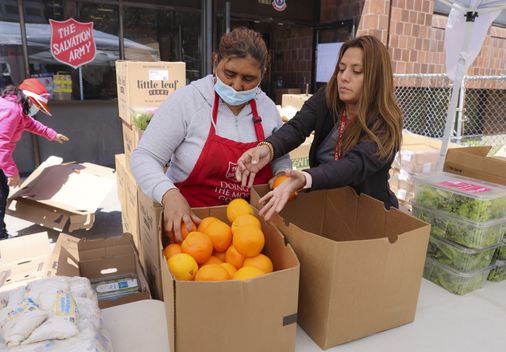Chelsea residents who received a no-strings-attached cash benefit early in the pandemic saw vastly better health outcomes than those who didn’t, a new study found.
Researchers said the Chelsea Eats guaranteed income program reduced emergency visits among participants by 27 percent, simply by doling out $400 each month to families between November 2020 and August 2021. The cash recipients in the low-income, predominantly Latino city also saw an 87 percent decline in ER visits for substance abuse and behavioral health, as well as a drop in hospitalizations, according to the study published Monday in the Journal of the American Medical Association.
Conversely, participants were more likely to visit outpatient subspecialists, which are important for managing health conditions but usually located farther from Chelsea, more costly to see, and less amenable to residents’ work schedules.
Time is money: Guaranteed basic income programs deliverShareWATCH: Seven towns are sending vulnerable families money with no strings attached. Reporter Esmy Jimenez unpacks the pros and cons. (undefined)
In the results lies a glimmer of hope that could help support guaranteed income programs in the future, advocates for such initiatives said.
Get Trendlines
A business newsletter from Globe Columnist Larry Edelman covering the trends shaping business and the economy in Boston and beyond.
Direct cash assistance has proved effective in fighting hunger and poverty in Chelsea, Cambridge, and beyond since COVID-19 struck. But the programs remain expensive to fund, especially as federal pandemic relief funds run dry.
The initial phase of Chelsea’s program was largely funded by that money, city funds, and grants, and it ended in 2021. A second phase ended in 2023.
The new study shows that reductions in health care spending could offset as much as half the costs of the Chelsea Eats program, said Sumit Agrawal, lead author of the paper and a physician at Mass General Brigham. (The randomized study was conducted by analyzing the medical records of 2,880 participants from Mass General Brigham, the Cambridge Health Alliance, and East Boston Neighborhood Health Center, which was recently renamed NeighborHealth.)

“There’s this prevailing belief that if you give low-income people cash, they’re going to spend it on drugs and alcohol,” he added. “The research shows this is not true. People need less acute care. They may not need to go to the emergency room for mental health crises — depression, anxiety, suicidal ideation — or substance abuse as much.”
The findings reinforce earlier studies that showed that low-income participants used the cash assistance responsibly. A 2022 paper from the Rappaport Institute for Greater Boston at the Harvard Kennedy School found that much of the guaranteed income money in Chelsea funneled to nearby food stores and restaurants, reduced food insecurity, decreased missed rent payments, and generally caused “lower levels of financial distress.”
There was no evidence, that report said, that receiving the cash cards decreased employment or hours of work among participants, a common criticism of welfare.
Lourdes Alvarez, a City of Chelsea employee who helped roll out the initiative in 2020, said the new study adds to the evidence that officials should find ways for basic income programs to continue, especially as the cost of living ratchets up in Massachusetts.
Chelsea briefly resurrected Chelsea Eats for a shorter, second round early last year for 650 families with over $800,000 in federal pandemic relief funds.
“This research shows this is working, but there is no Chelsea Eats anymore,” Alvarez said. “We’re talking about a benefit of a program that no longer exists.”
She added that hardworking Chelsea residents are struggling to stay in their homes in the face of rising rents and costs of living.
“It’s so hard right now to live in the US that we need to have policies to support residents to stay in the place that they live,” Alvarez said. “If we don’t start considering these policies, we are opening the door for gentrification of communities like Chelsea.”
If nothing else, the study is a sign that the initiative — once the country’s biggest guaranteed income experiment — worked as anticipated and could work again, said Jeffrey Liebman, director of Harvard’s Taubman Center for State and Local Government.
“The nice thing about giving them unrestricted cash benefits is that the government does not need to be omniscient and guess what needs people have,” he said, noting that participants used the money for food, health, and housing. “If there’s one thing that has come out of all the guaranteed income studies, it’s that we can trust people to make good decisions.”
Diti Kohli can be reached at diti.kohli@globe.com. Follow her @ditikohli_.

